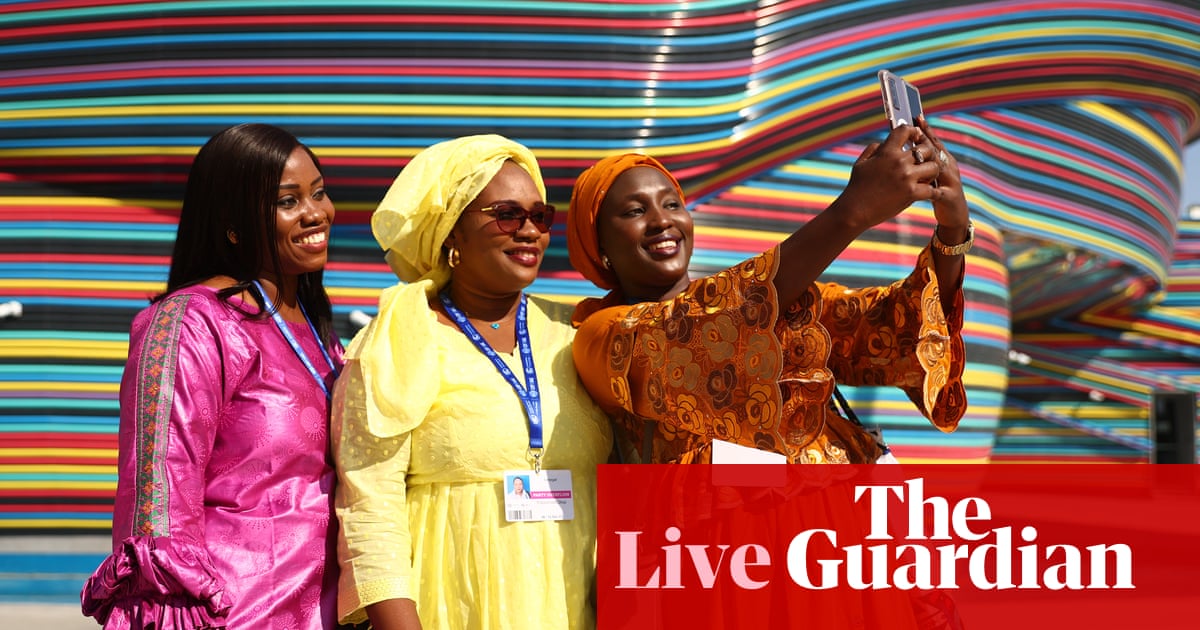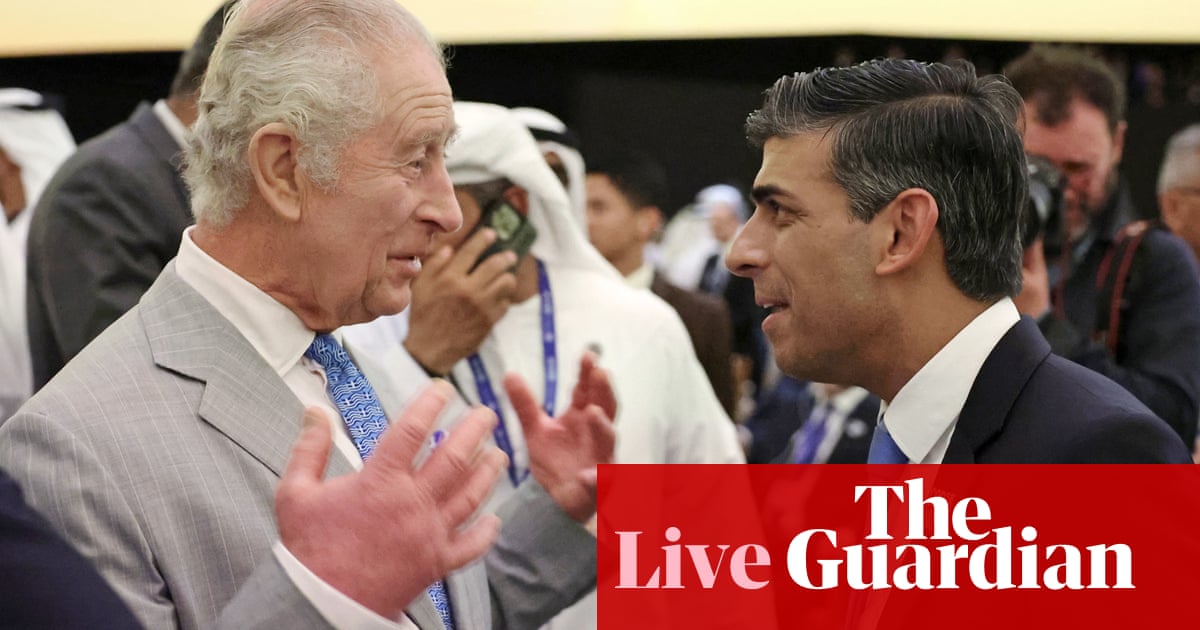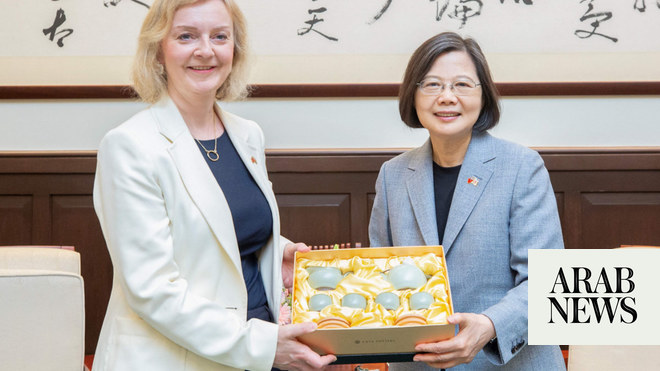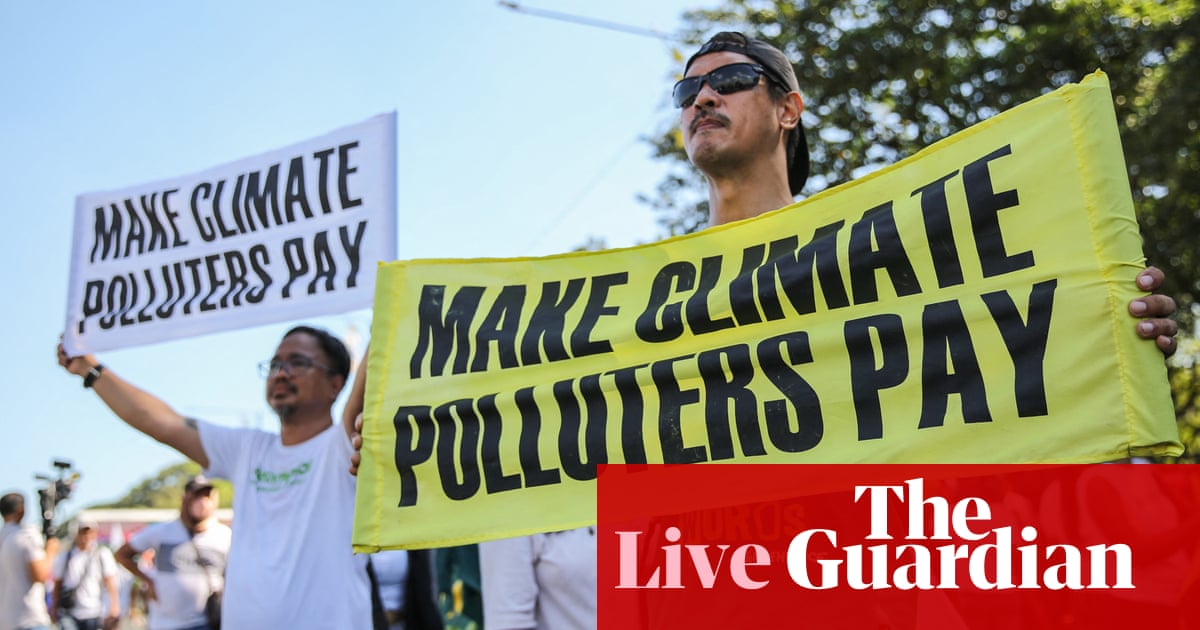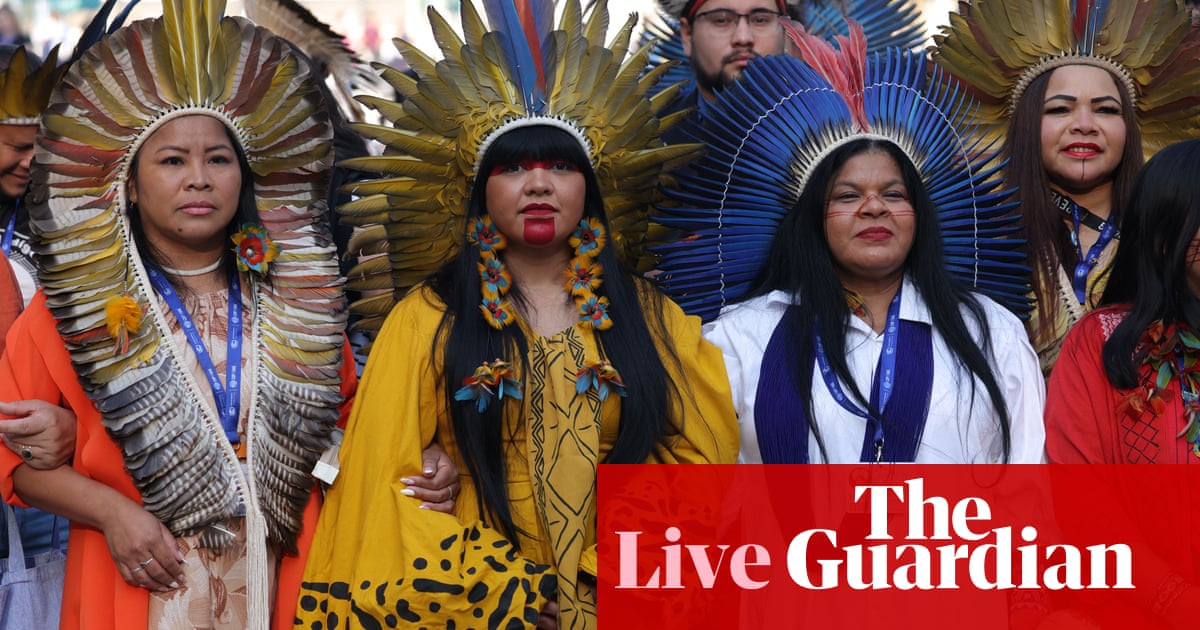
"Failure is not an option" - Al Jaber
Sultan Al Jaber, president of Cop28, made a last-ditch call for all countries to come together this afternoon in Dubai, to find common ground amid deep disagreements over the future of climate action.
Everyone would be listened to, he said, emphasising as he has done from the start that this must be an inclusive process. “Everyone’s experience and national circumstances have merit and will be taken in consideration. We will not ignore anyone. As I’ve said many times, we will not neglect any issue, we will not neglect or undermine or underestimate any of the views or the national circumstances of any region or any country. And I promise that they will all be heard,” he said.
That chimes with what we have been hearing from developing countries at this Cop, who have praised the presidency for listening to them.
Many are still unhappy that adaptation, a key issue for them as they grapple with the disastrous impacts of the climate crisis, has not been given enough attention. They find the existing text on adaptation too weak.
The question of the phase out or phase down of fossil fuels is also still unresolved. Al Jaber called on countries to “switch gears” to find compromises.
He looked back to the “very successful” start of the talks, when an agreement on a fund for loss and damage in poor and vulnerable countries was reached on the first day. “I’ve called on everyone to maintain that spirit of positivity, openness, tolerance, acceptance, motivation, delivery, action. This is the same spirit we need to double down on at this point in time. And I want everyone to remember that we have a unique opportunity, it is our opportunity to deliver an outcome that is based on the science lead by the science and equipped by the science that keeps 1.5 within reach. And that will help transform economies for generations to come,” he said.
“The time has come for all parties to constructively engage, I want everyone to show flexibility,” he insisted.
This was the first Cop presidency to address fossil fuels, he reminded journalists at a brief media appearance outside the negotiating halls on Sunday afternoon, with the talks scheduled to end at 11am on Tuesday. The presidency has promised a new text on Monday morning, and is convening all parties ahead of that to hammer out a compromise on key issues such as the phase out or phase down of fossil fuels.
“None of this is a surprise,” he told journalists. ”This is exactly how this particular process works. Ultimately, it all boils down to the need for all parties to come to terms with the fact that we will deliver the highest ambition and to do that we need to be more flexible and we need to accept to compromise and that all parties should come to terms with these facts. I am confident we can work through these issues.”
But he also warned that though compromise would be necessary, it could not mean a watering down of ambition. “Failure, or lack of progress, or watering down ambition is not an option. I have clearly communicated many, many, many times in the past. And I did it yesterday, and I will do it again today. Failure is not an option. What we’re after is the common good. What we’re after, is in the best interest of everyone, everywhere. And what I’m going to stay laser focused on is the science and keeping 1.5C alive.”
And he looked forward to a deal, with an optimism that few previous Cop presidents have ever shown at this stage of proceedings. “I need everyone to do their part to get us to the finish line and celebrate the highest ever ambition.”
Summary
Here’s a recap of some of the main developments of the day at Cop28 in Dubai:
Conference president Al Jaber has warned that “failure is not an option” as he prepares a final package for delegates.
Vulnerable countries are unhappy at the weak language on climate adaptation.
Human Rights Day marked by civil society complaints about restrictions on protest.
Experts are worried that carbon emissions trading could become a “black box’ due to inadequate transparency.
Global food production will become ‘problematic’ even at 1.5C, a US envoy has predicted.
Argentina is due to swear in a new climate-denying president who has reportedly put the tourism minister in charge of the environment.
Tense days ahead - what former Manchester United manager Alex Ferguson used to describe as “squeaky bum time.”
That’s all for today’s live blog. Many thanks for following.
Obstructing nations must cease "subterfuge", says Mary Robinson
Mary Robinson, chair of The Elders, has demanded that “nations obstructing a liveable future must abandon their subterfuge” as Cop28 reaches its critical final days.
She called out Saudi Arabia and its allies, as well as naming the US, China, the EU and India, for hiding in the shadows. She urged the countries, and Cop28 president Sultan Al Jaber, to deliver the right legacy at Cop28, including an agreement to “phase out all fossil fuels”, seen as the critical test of success.
There was uproar at Cop28 a week ago when the Guardian revealed ill-tempered responses by Al Jaber to questions on a fossil fuel phase out from Robinson during an online event shortly before Cop28.
In comments sent first to the Guardian on Sunday, Robinson, a former UN envoy for climate change, said:
“Those at the negotiating table at Cop28 are steering the course of our shared future: their success or failure will resonate for generations. I fear Cop28 is falling short of what is required to stay within the 1.5C warming threshold. The science tells us we are in grave danger of bequeathing our children a completely unliveable world.
There are countries here with the capacity to ensure the outcome of this summit is historic for the right reasons. They need to lean in now with ambition and urgency. Cop28 presents an opportunity for leaders to be on the right side of history.
Nations obstructing a liveable future must abandon their subterfuge. The nations thwarting progress are those with the greatest stakes in fossil fuels but also the most plentiful resources to act. Saudi Arabia and allies are holding talks hostage. However it is not the only country hindering progress: the USA, China, the EU and India have been happy to hide in the shadows cast.
There is still time for these countries to step up with the courageous leadership required to tackle this existential threat. Governments must not leave this summit without an agreement to phase out all fossil fuels and this agreement must not be at the expense of other critical workstreams here. Cop28 will leave a legacy that those here in Dubai will be remembered for: I call on all [countries] and the Cop Presidency to make sure it is the right one.”
At the online event on 21 November, Al Jaber told Robinson: “There is no science out there that says that the phase-out of fossil fuel is what’s going to achieve 1.5C.” He added: “Show me the roadmap for a phase-out of fossil fuel that will allow for sustainable socioeconomic development, unless you want to take the world back into caves.” His comments were strongly rejected by scientists and called “verging on climate denial”.
At an emergency press conference on Monday, Al Jaber was forced to clarify his views: “I have said over and over the phase-down and the phase-out of fossil fuel is inevitable. In fact, it is essential.” He also said: “I have incredible respect for Mary Robinson.”
The pair met on Saturday. Robinson’s post on X said “they agreed on there being no time to waste delivering an ambitious outcome” and reiterated her call for countries at Cop28 “to unequivocally commit to phasing out all fossil fuels”. An official Cop28 post said Al Jaber had sought from Robinson “guidance and counsel on convening diverse voices to find solutions to shared problems”.
The United States needs to step up at this crucial stage in the talks because it is more to blame for emissions than any other country. So says Jean Su, energy justice director at the Center for Biological Diversity:
“The US needs to shift into high gear in this final lap of Cop28, where it is a key driver in the race to a fossil fuel phaseout commitment. The US has climate diplomacy heft like no other, and unmatched responsibility as the world’s largest oil and gas producer and historical emitter. These are the final hours for Secretary (John) Kerry to bring big main character energy and lead this COP to a breakthrough fossil fuel phaseout with a 2030 deadline and no weasel words on abatement. A fossil fuel phaseout is the test of this COP’s success, and failure is not an option.”
Natalie Jones, a climate policy adviser at the International Institute for Sustainable Development, has posted a useful thread on both the “theatre” of the climate talks and the latest twists and turns in the negotiations.
She notes that the ministers shepherding the global stock take and discussions on phasing out fossil fuels had “nothing substantive to say about the energy package” when they had a chance to report back last night beyond there being a divergence of views on whether fossil fuels should be phased out or phased down.
Fascinatingly, Jones also described how this stage of the talks works. They are organised as “majlis”, which is a very small circle of ministers and heads of delegation with Cop28 president Al Jaber at the centre.
It is open to observers, which is remarkable. Jones provides many juicy details, including an impressive intervention by Colombia that brings 2030 into the discussion. A welcome change from the tactic of other countries to push everything back to 2050.
Based on her nine years as a COP watcher, Jones expects the talks to run past Tuesday’s nominal final day, and extend well into Wednesday and possibly Thursday. There goes my plans for the week.
I highly recommend the entire thread.
Argentina’s Milei to put environment under tourism ministry
Argentina’s new far right president elect, Javier Milei, will be inaugurated in Buenos Aires later today, ushering in an uncertain future for the environment in the South American country.
The chainsaw-wielding economist is a climate change denier and the country’s environment ministry is among those that will cease to exist from today once Milei is in the Casa Rosada.
The Guardian understands a representative from his government is on their way to Dubai for Cop28. Instead of having an environment minister, Milei has allocated responsibility for the environment to his tourism minister, who will also oversee sport, according to Argentine media.
From swathes of the Chaco dry forest - South America’s second largest - to the disappearing glaciers of the Andes, Argentina is home to numerous environmental wonders. My colleague Sylvia Colombo reports, they and Argentina’s indigenous communities face growing threats under new leadership.
"Failure is not an option" - Al Jaber
Sultan Al Jaber, president of Cop28, made a last-ditch call for all countries to come together this afternoon in Dubai, to find common ground amid deep disagreements over the future of climate action.
Everyone would be listened to, he said, emphasising as he has done from the start that this must be an inclusive process. “Everyone’s experience and national circumstances have merit and will be taken in consideration. We will not ignore anyone. As I’ve said many times, we will not neglect any issue, we will not neglect or undermine or underestimate any of the views or the national circumstances of any region or any country. And I promise that they will all be heard,” he said.
That chimes with what we have been hearing from developing countries at this Cop, who have praised the presidency for listening to them.
Many are still unhappy that adaptation, a key issue for them as they grapple with the disastrous impacts of the climate crisis, has not been given enough attention. They find the existing text on adaptation too weak.
The question of the phase out or phase down of fossil fuels is also still unresolved. Al Jaber called on countries to “switch gears” to find compromises.
He looked back to the “very successful” start of the talks, when an agreement on a fund for loss and damage in poor and vulnerable countries was reached on the first day. “I’ve called on everyone to maintain that spirit of positivity, openness, tolerance, acceptance, motivation, delivery, action. This is the same spirit we need to double down on at this point in time. And I want everyone to remember that we have a unique opportunity, it is our opportunity to deliver an outcome that is based on the science lead by the science and equipped by the science that keeps 1.5 within reach. And that will help transform economies for generations to come,” he said.
“The time has come for all parties to constructively engage, I want everyone to show flexibility,” he insisted.
This was the first Cop presidency to address fossil fuels, he reminded journalists at a brief media appearance outside the negotiating halls on Sunday afternoon, with the talks scheduled to end at 11am on Tuesday. The presidency has promised a new text on Monday morning, and is convening all parties ahead of that to hammer out a compromise on key issues such as the phase out or phase down of fossil fuels.
“None of this is a surprise,” he told journalists. ”This is exactly how this particular process works. Ultimately, it all boils down to the need for all parties to come to terms with the fact that we will deliver the highest ambition and to do that we need to be more flexible and we need to accept to compromise and that all parties should come to terms with these facts. I am confident we can work through these issues.”
But he also warned that though compromise would be necessary, it could not mean a watering down of ambition. “Failure, or lack of progress, or watering down ambition is not an option. I have clearly communicated many, many, many times in the past. And I did it yesterday, and I will do it again today. Failure is not an option. What we’re after is the common good. What we’re after, is in the best interest of everyone, everywhere. And what I’m going to stay laser focused on is the science and keeping 1.5C alive.”
And he looked forward to a deal, with an optimism that few previous Cop presidents have ever shown at this stage of proceedings. “I need everyone to do their part to get us to the finish line and celebrate the highest ever ambition.”
Is it too early to start thinking about the next COP, which will take place in Azerbaijan?
The decision, announced yesterday, will mean the climate summit has been hosted by three of the world’s top 40 petrostates in a row, according to the definition provided by Carbon Tracker.
Azerbaijan is also involved in a conflict funded by fossil fuels as The Guardian’s energy correspondent Jillian Ambrose reported in an exclusive last month.
The United Nations works in mysterious ways, but surely there was a safer pair of hands for the world’s fragile climate.
Cop28 using an out-of-date number for global heating, warn scientists
The Cop28 negotiating text is using an out-of-date number of 1.1°Celsius for the global heating caused by humanity to date. The true figure is about 1.3C, according to Richard Betts at the UK Met Office.
That matters, he told The Guardian: “It’s important because it shows we’re actually closer to 1.5C. So the urgency is even greater, both for reducing emissions and also for adaptation as well.” The 1.5C is the limit in the Paris Agreement, set to avoid the worst impacts of the climate crisis.
The 1.1C figure for the temperature rise caused by global heating is from the most recent report by the Intergovernmental Panel on Climate Change. But it is the average for the period from 2011 to 2020, meaning it effectively represents 2015.
But emissions and global heating have continued to surge since 2020. A new analysis by Betts and colleagues finds the human-caused temperature rise today is 1.3C.
This assessment is based on the average across 20 years: the decade up to 2023 and the projected future temperatures to 2032. That 20–year method is in fact consistent with the way the IPCC already deals with future temperatures, Betts said.
Global food production "problematic" even at 1.5C, warns US envoy
Farming and food production around the world will suffer severe impacts from the climate crisis even if the world does manage to hold global temperature rises to 1.5C above pre-industrial levels, the US special envoy for global food security, Cary Fowler, told the Guardian at Cop28.
“Agriculture will have significant problems at 1.5C, it’s going to be even more problematic than today,” he warned. “The worst years climatically for agriculture in the past will be the best years for agriculture in the future. That is pretty sobering. We have to do everything we can to reduce global warming.”
Temperature rises will affect all aspects of food production, he warned. “Heat affects all aspects of a plant’s growth cycle,” he warned, from germination to ripening, and the timing of the plant’s development.
He said more research was needed into how to make food crops more resilient to extreme weather. “In many countries, we’ve had stagnation in agricultural research and development,” he said. “If you look back, we have counted on incremental increases in agricultural productivity, but we can’t do that now.”
He said agricultural productivity had been declining in some areas of Africa, and globally was increasing by about 1.14% a year, when it needed to increase by about 1.91% a year to meet the world’s food needs by 2050.
Fowler is also particularly concerned about poor diets. In parts of Africa, childhood stunting impacts about a third of children, which is storing up massive problems for their future mental development and the fate of those countries. The key to preventing childhood stunting is diversity in the diet – this is not just a question of getting more calories to children, but in getting different sorts of foodstuffs, such as a variety of fruits and vegetables as well as starchy staples, into their diets.
“This is somewhere we really need to make a difference,” he said.
Emissions trading could become ‘black box’, experts warn
Proposals on country-to-country emissions trading could become a “black box” that undermines the integrity of the Paris agreement, experts have warned.
Alongside language on fossil fuels and climate adaptation, governments are negotiating the rules for the carbon market that underpins the Paris agreement in Dubai.
Once operational, large polluters like the UK and Saudi Arabia will be able to purchase carbon credits from states with major carbon sinks such as Brazil and Indonesia to meet their own national contributions towards limiting global heating. But there are concerns that if countries agree on weak rules, worthless credits could be generated by the system - undermining efforts to tackle the climate crisis.
New text on country-to-country emissions trading was published on Saturday evening, covered by Article 6.2 of the Paris agreement. It no longer includes rules or guidance on confidentiality of carbon deals, meaning that governments would never have to make public details of the agreement, provoking widespread concern.
Erika Lennon, senior attorney with the Center for International Environmental Law, said:
“Even after a year of scandals exposing widespread failure and fraud in the carbon market, negotiators seem not to have learned any lessons. The latest proposals for carbon trading under discussion lack any meaningful oversight and transparency. Accepting them would be a win for carbon cowboys and a massive loss for people and the planet.”
Gilles Dufrasne, policy lead with Carbon Market Watch, said:
“Article 6.2 is about to become a black box. To shine a light on carbon trades, we need at least to have clear limits on confidentiality provisions, real consequences for countries that don’t play by the rules and guardrails against countries that want to backtrack on the activities they have authorised. The current text doesn’t include any of that.”
Climate Policy Analyst Catalina Gonda said:
“The decisions made by countries at COP28 regarding the rules for carbon markets will have direct and substantial consequences for both the climate and communities on the ground. The eagerness to implement Article 6.2 should not come at the cost of compromising on robust rules. The text we have today undermines the Paris Agreement, and jeopardizes transparency and accountability”.
Joab Okanda, Senior Climate Adviser at Christian Aid in Kenya, was similarly scathing:
“A blank sheet of paper would be as effective as the UNFCCC carbon market rules as they stand. It’s an insult to the people in parts of Africa that are facing the very real threat of losing their homes and access to their land. If the negotiations end like this, the carbon colonialists will come knocking, and being able to do anything about it will become incredibly difficult.”




